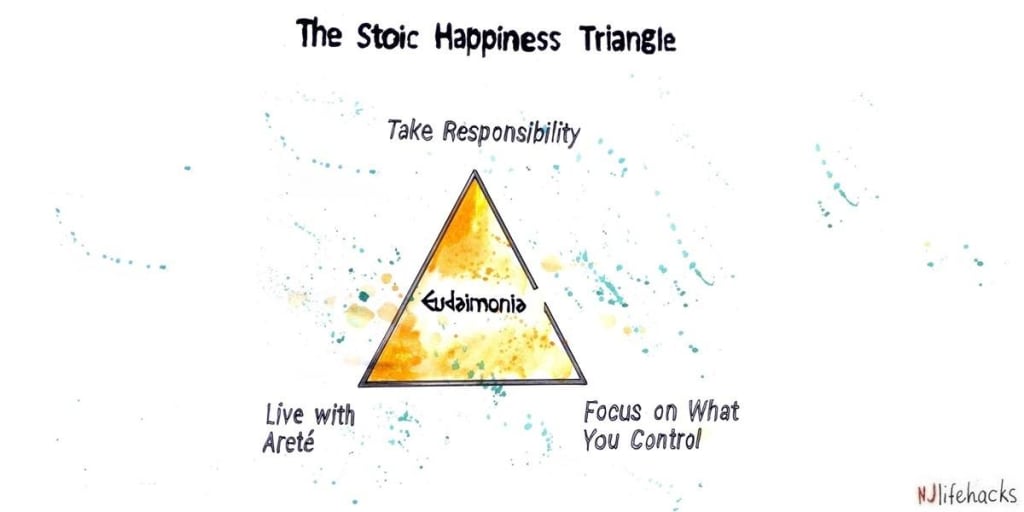The Stoic Way: Embracing Tranquility and Resilience in a Chaotic World
Rediscovering Ancient Wisdom to Find Purpose, Inner Strength, and True Freedom

What makes life truly worth living? In today's fast-paced world, it often feels like we're caught in a never-ending race, chasing milestones and societal expectations. Study, work, get married, have children, work some more, retire, and maybe then, we can finally start living. But amidst this whirlwind, we can't help but question the true meaning of life—a question that has echoed throughout human existence.
Let's embark on a journey back in time, 2,300 years ago, to the vibrant city of Athens in ancient Greece. Picture the Agora of Athens, a bustling public space where life thrived. Merchants haggled, politicians debated, and philosophers engaged in spirited discussions. It was within the Painted Stoa, a distinct area of the Agora, that Zeno of Citium began to shape his ideas, which would later evolve into Stoicism. The impact of his philosophy has endured the test of time.
Now, let's dive into an anecdote from Zeno's life, which sheds light on his transformative journey. Legend has it that Zeno, once a prosperous merchant, faced a tempestuous storm during a perilous voyage across the Mediterranean. He lost all his material wealth, left with nothing but his own life. Instead of succumbing to despair, Zeno sought solace in reason, seeking to comprehend how to navigate life's unpredictable nature. It was in this moment that Stoicism began to take shape—a philosophy centered around using reason to confront emotions, steer clear of vices, and cultivate virtues. A key tenet of Stoicism was the cultivation of apathy, not in the modern sense of indifference, but rather as a means of emotional control.
Apathy, or 'apatheia' in Greek, derives from 'a' (negation) and 'pathos' (passion). In Stoicism, apathy signifies the absence of turbulent passions—a state of tranquility, free from the overwhelming grip of emotions. However, it's essential to shed our conventional understanding of apathy and passion. Apathy, as the Stoics believed, is about harnessing emotions rather than rejecting them. It's about finding balance, not being consumed by pleasure or devastated by misfortune.
To attain this tranquility, apathy necessitates distinguishing between what we can control and what lies beyond our influence—a task easier said than done. Stoic philosophy, rooted in ancient Greece, comprises three integral components: ethics, logic, and physics. These concepts, however, differ significantly from their modern interpretations. So, let's venture further and seek guidance from Diogenes Laërtius, a renowned biographer of Greek philosophy, who aptly described Stoicism as a living creature, with logic as its bones, ethics as its flesh, and physics as its soul.
In the Stoic worldview, they envisioned a meticulously ordered and harmonious universe, governed by reason and predetermined by fate. The laws governing this universe permeated every aspect of existence, including ourselves. Thus, the Stoics embraced determinism—a belief that everything happens for a reason, with the present being the consequence of a chain of past causes, an inescapable sequence of events. The universe operated independently of us, following its natural course.
Though this deterministic perspective may appear daunting, the Stoics found great solace in it. It provided them with a profound sense of liberation—a release from fretting over matters beyond their control. As the wise Epictetus once stated, 'We suffer more often in imagination than in reality.' Stoicism offered a powerful reminder to focus on the present moment and direct our energy toward what we can influence.
By incorporating Stoic principles into our lives, we can learn to embrace adversity, face challenges head-on, and develop inner resilience. Stoicism encourages us to detach ourselves from external outcomes and instead prioritize our internal virtues. It teaches us to seek wisdom, exercise self-discipline, and foster moral integrity. Stoics believed that true freedom lies not in material possessions or external circumstances but in mastering one's own mind and embracing a virtuous life.
In conclusion, the timeless wisdom of Stoicism invites us to reevaluate our perception of life's purpose. By cultivating emotional control, identifying what lies within our sphere of influence, and embodying moral virtue, we can discover a path towards tranquility and fulfillment. So, let us delve into the ancient teachings of Stoicism and uncover its transformative power, as we navigate the complex tapestry of existence with grace and resilience.





Comments
There are no comments for this story
Be the first to respond and start the conversation.